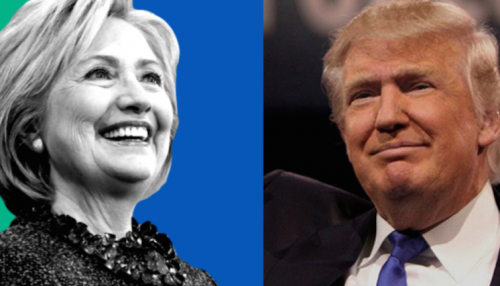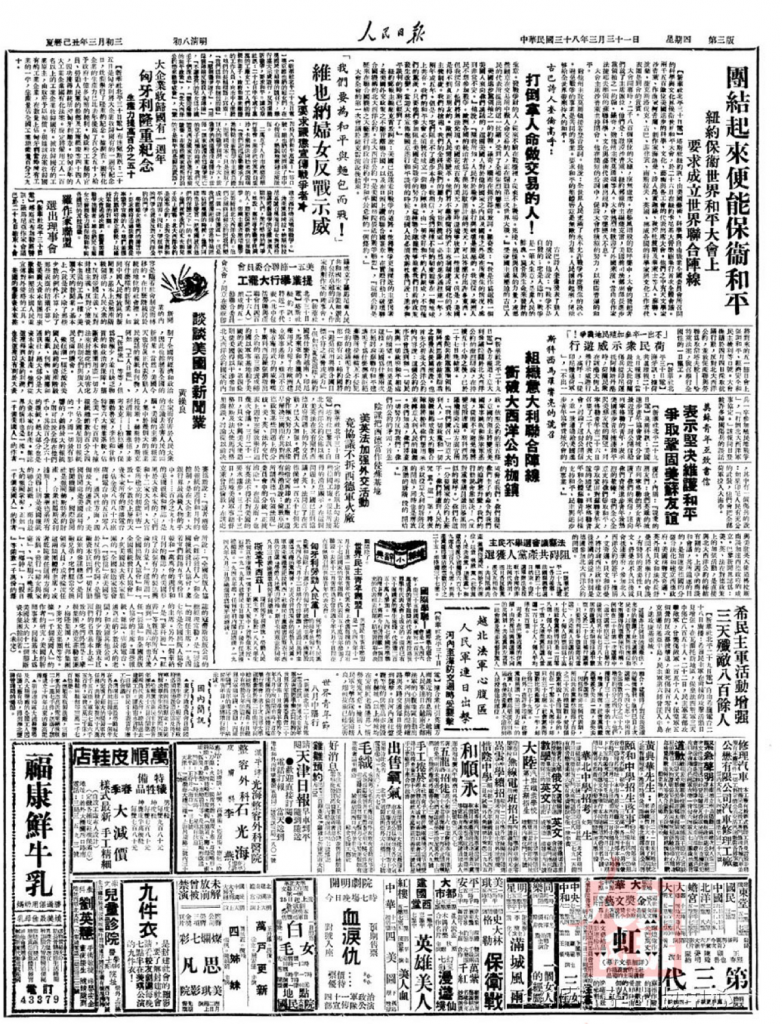IN AN OP-ED YESTERDAY, the Global Times, a newspaper on international affairs published by the Communist Party’s official People’s Daily, argued that the U.S. presidential race has exposed the farcical nature of Western media and their claims to independence and professionalism.
After suggesting that the lack of endorsements of Republican nominee Donald Trump by major American dailies “lays bare” an overwhelming political bias in the U.S. media, the op-ed (English version here) shortcuts for a broad generalisation about “the West” and its free speech pretensions:
The West has not only deeply affected the global way of thinking, but also developed political correctness and moral standards to serve their interests. For example, the American media that are hardly objective have misled the world by self-claimed “objectivity.”

The article concludes by arguing that “media outlets in the US and the West” must be pulled down from their pedestals: “It’s time to de-deify them.”
The Chinese Communist Party has long used attacks on the foreign press, and particularly the American press, to make the case for the superiority of China’s socialist system, and to stave off international criticism. Over the past three decades, articles in China’s state media mentioning “freedom of speech” have generally been pejorative, referencing “so-called freedom of speech.”
The anti-Western tone has grown more pronounced, however, under President Xi Jinping, who has emphasised the supremacy of the Marxist View of Journalism, and the need for all media to tow the Party line. A 2013 “Communique on the Current State of the Ideological Sphere,” leaked from the Chinese Communist Party’s Central Committee, outlined what became known colloquially as the “Seven Don’t Speaks.” The document spoke of a “fierce struggle” in Chinese society over such dangerous ideas as “constitutional democracy” and “universal values,” which it viewed as imminent threats to the Party’s leadership.
As the communique spoke of “the ideas of the capitalist class,” the old ideological lines, long fading from the Party’s propaganda work, were sharpened once again.
Number five on the communique’s list of taboos was “promotion of the West’s idea of journalism.” Anticipating by three years Xi Jinping’s February 19, 2016, speech on news and public opinion work and the idea that “must be surnamed Party,” the communique said:
Some people, under the pretext of espousing “freedom of the press,” promote the West’s idea of journalism and undermine our country’s principle that the media should be infused with the spirit of the Party.
The West’s trumpeting of “freedom of the press,” said the communique, was nothing more than a weapon to attack the leadership of the Chinese Communist Party and “gouge an opening through which to infiltrate our ideology.”
The communique was in retrospect a sign of things to come, and the environment it helped to define has coaxed some of China’s leftist ghosts out of the woodwork.
One of those ghosts is Liu Zuyu (刘祖禹), a longtime propaganda official who was a core member of the powerful and secretive News Commentary Group when it shutdown Freezing Point more than ten years ago. In December 2013, in the wake of the communique, a stooped and white-haired Liu Zuyu delivered a very public keynote address at an event hosted by the leftist journal Utopia to commemorate the 120th anniversary of the birth of Mao. He was back in place of honour in May this year during an official forum on the “research results” of the Marxist View of Journalism, where he praised Xi Jinping’s tough approach to media control and said that “some of our media [in China] have been deeply affected by the bourgeois journalism views of the West, and that this situation has been cause for great happiness in the West.”
“Some of our media and journalists,” said Liu, “have intentionally and unintentionally become the assistants and the accomplices of Western hostile forces, and this must cause us to be far more vigilant.”
Liu quoted Xi Jinping as having remarked during the Party’s February conference on news and public opinion work that, “Some people praise Western media as public instruments, as a fourth estate and as the uncrowned king, and they raise the flag of freedom of the press in attacking the leadership of the Party and the socialist system.”
The idea that Western media are false-hearted conspirators who pay lip service to the facts while they seek to undermine Chinese socialism is very much in vogue again in official circles — though of course it never quite went out of style.
Back in April, Zheng Baowei (郑保卫), a professor of journalism at Renmin University of China, published a page-seven piece in the Party’s official People’s Daily in which he dusted off the argument that the Western media were merely tools of capital and related political interests, that notions of “objectivity” and “independence” were just a ruse. After suggesting in total seriousness that American media had “restricted” coverage of Occupy Wall Street because it was a “negative incident” — when in fact media had reported introspectively on their own flawed coverage — Zheng concluded:
From this we can see that media in Western countries cannot extricate themselves from the relationship with politics and political parties. Moreover, in Western countries the truly deciding factor is capital. Those monopoly financial groups that control the country’s economic lifelines will always put the ownership and discourse power of the media in their own hands.
Yesterday’s Global Times op-ed suggests that now, in the midst of the U.S. presidential election, is the time to “de-deify” the Western media. But the fact is that it has always been the right time in China’s Party-run press to point fingers at Western, and especially American, journalism.
Digging recently through the archives of the People’s Daily, I came across an article called “Talking About America’s News Industry” (谈谈美国的新闻业), published on March 31, 1949, six months before the founding of the People’s Republic of China. The article was written by Huang Caoliang (黄操良), who was head of the international news desk at the People’s Daily in the 1940s and eventually authored several books, including two on the Korean War. It’s worth noting the Huang’s article, while taking what some might see as quite a prejudicial view on the American press of his day — and relying on a single American source — at least puts forth facts to support the argument that journalism and press freedom on the United States are undercut by ownership.

The People’s Daily page is a wonderful look back on newspaper’s old layout as well, from a time when it was in fact chockfull of local advertisements — for the Wan Shun Leather Shoe Shop, offering “great discounts,” for Fukang Fresh Milk, and even for subscriptions to the Tianjin Daily.
An excerpted translation follows.
Talking About the American News Industry
By Huang Caoliang / March 31, 1949 / People’s Daily
The content of the news industry transforms according to social systems. Whatever class holds ruling status in a society determines what kind of news industry it has. For example, just as the news industry in the areas liberated by the Chinese people is essentially a tool under the leadership of the proletariat, belonging to the masses, opposing imperialism, opposing feudalism and opposing bureaucratic capitalism, the news industry in America today is essentially (which is to say, aside from those few alternatives, those exceptions which prove the rule) a tool used by big American capitalists to deceive and suppress the people of that country and propagandise external aggression.
Monopoly capitalists in America control the economics and politics of the entire country, and therefore they also control the news industry of the entire country. Of course, America today also has newspapers and periodicals that truly represent the voice of the working people, for example The Daily Worker and The Masses. But there are only a small number of these, and they lack political and material support. Monopolistic capitalist groups do their utmost to suppress them, harm them, and limit the public’s exposure to them.
The vast majority of the bourgeois newspapers, periodicals, broadcasts and news agencies facing the American people like a mad tide of inundation are assets belonging to big capital. Here they are raking in massive profits, and here they are spreading ideas that benefit the big capitalists to the detriment of the people. The principal newspapers of America are held in several major newspaper trusts: Hearst and Scripps — Howard and McCormick — the Pattersons . . . Reed and Gannett, these are the six major newspaper groups, holding forty percent of the 1,749 newspapers sold in America, accounting for half of the country’s sunday newspapers. Moreover, it can be said that all of the major-selling newspapers are in their hands. And most of the remaining sixty percent of newspapers are also assets held by big capitalists.
The situation in magazine publishing is the same. “The control of weekly and monthly magazines that command double the readership of the newspapers are all in the hands of senior people at major enterprises and banks,” said George Seldes, the author of One Thousand Americans. “Ninety-nine percent of American newspapers and magazines belong to big capital, and the interests of these rich and powerful align with the system they built.”
The total number of radio stations held by a small number of most senior big capitalists account for 508 of America’s 886 radio stations. Turning to wire services, there are the four major wire services as well as the United States Information Service, which is a news agency of the US Government. The International News Service is an asset in the Hearst system, while United Press International is owned by the Scripps and Howard system. The Associated Press is in fact a united organisation of American newspapers, and it is in the hands of the largest newspaper families. As the One Thousand Americans author explains: “The national publisher’s association (Magazine Publishers Association) and the National Newspaper Publishers Association both rely on their combined fifty million circulation of dailies and millions in weekly and monthly magazine circulation to constitute a powerful force in America for manufacturing public opinion.” Together the so-called “Magazine Publishers Association” and “National Newspaper Publishers Association” are the twin brother of the National Association of Manufacturers (NAM being synonymous with the reactionary in America, as the central staff headquarters of the reactionary policies of major monopoly capitalists). Leaders are often exchanged among the associations, or the chairmen serve in succession at two different associations, or in some cases even serve concurrently in head posts at two different associations.
. . . .
The names of the bosses at the top of these newspapers, magazines, radio stations and wire services basically match up with the names of the bosses at a small number of America’s major companies and banks. They are: the Morgan Group, the Mellon Group, the DuPont Group and the McCormick Group, etcetera. According to the research of the author of One Thousand Americans, the American news industry is essentially controlled by America’s twelve major monopoly capitalist groups.




















